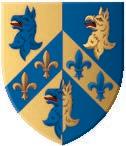



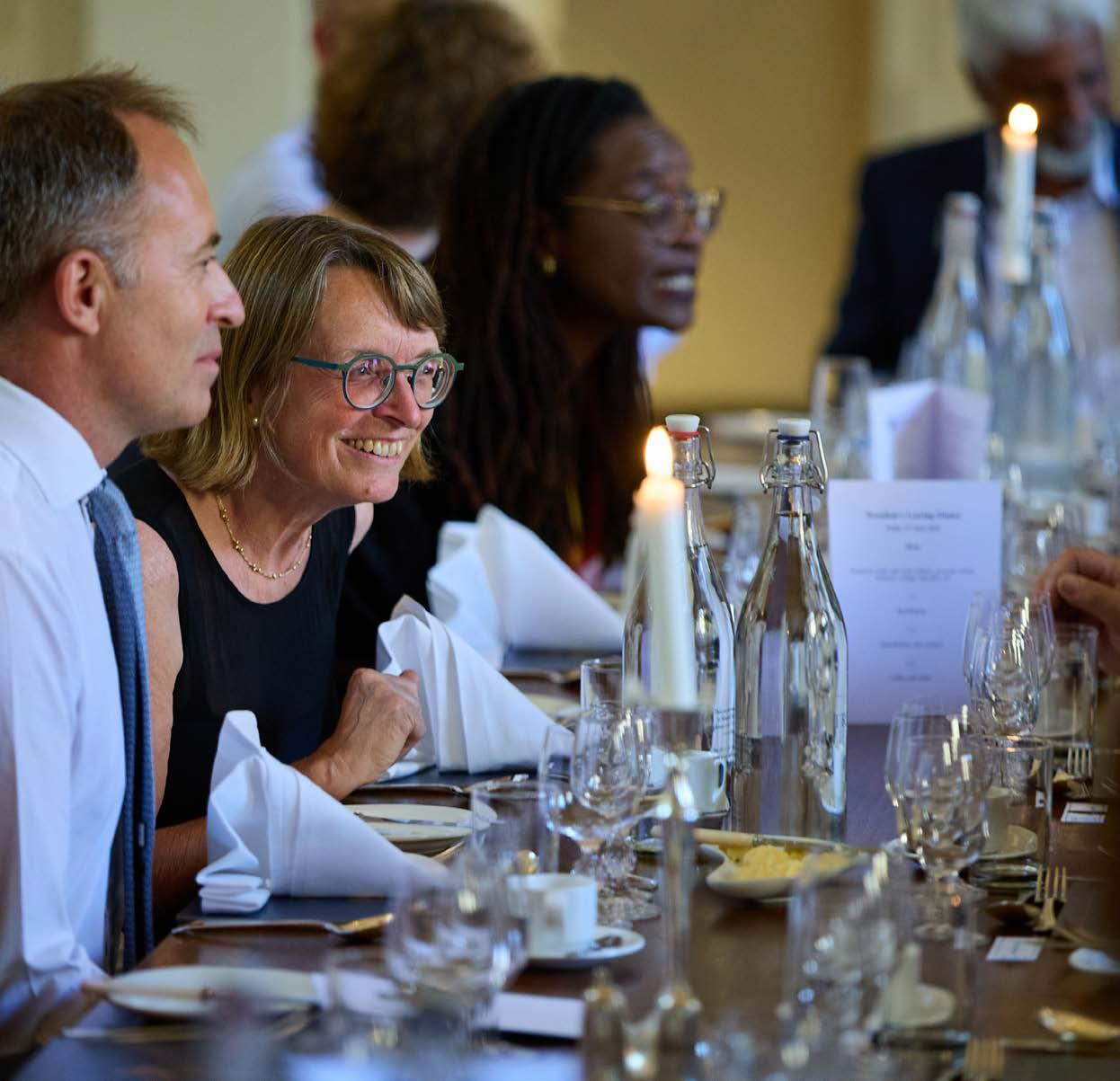






Iwrite my final President’s introduction to the Newsletter having waved off our undergraduates for the summer and said farewell to those students leaving Trinity to embark on the first step in their careers. During the coming 48 hours Oxford will welcome thousands of prospective students visiting for the annual Open Days, and so the cycle continues.
The summer term was characterised by that distinctive Oxford combination of preparation for examinations coupled with croquet, rowing, May Morning festivities, barbecues and garden plays. The Trinity Players distinguished themselves with a well-received production of The Great Gatsby to commemorate the centenary of Scott Fitzgerald’s novel. In the same week, over two hundred members of our community signed up for the college barbecue, held this year at the sports ground and combined with a football tournament in aid of leukaemia research, organised by the JCR and MCR in memory of our much-missed maintenance colleague, Wayne Shorter.
whose generosity made possible this restoration of the border. The view from the Stuart Gates to the Wren building in Garden Quad is once again acting as a magnet for tourists and city residents alike.
Adjacent to the Stuart Gates, the newly installed door designed by Sir Antony Gormley is also attracting interest, with a regular stream of visitors peering through its spyhole and pausing to read Simon Armitage’s poem. We offer our warmest congratulations to Sir Antony on being made a Member of the Order of the Companions of Honour (CH) in the King’s Birthday Honours 2025.
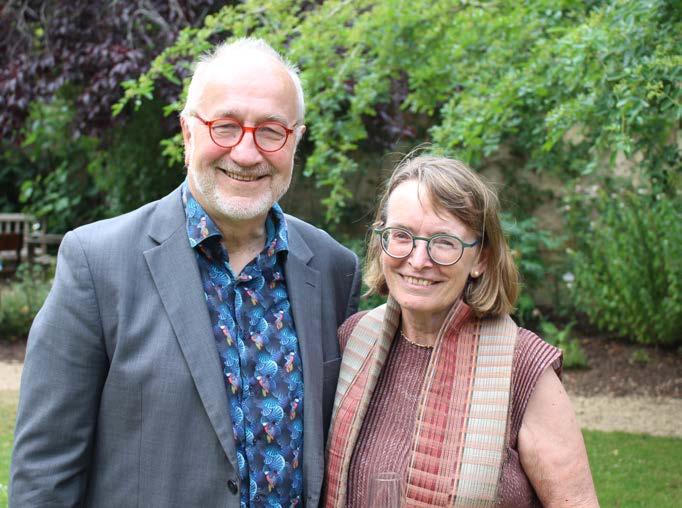
College grounds restored and embellished
Under the leadership of Head Gardener Kate Burtonwood, our in-house gardening team undertook the ambitious task of planting the newly conceived herbaceous border, designed by renowned garden designer Chris Beardshaw. Some five-and-a-half thousand plants were planted in just four weeks and the task was completed ahead of schedule. Our risk assessment for this vast project had registered ‘rain’ as being a key risk; in the event the team has had to contend with drought and extreme heat and has been watering the new border to sustain the plants as they establish. The design of the garden will become apparent over the next two summers. It is planted to a scheme that will require low maintenance, with year-round interest and, after establishment, will have no need of watering. We are enormously grateful to Old Member Henry Shohet (1972),
These two projects—Antony Gormley’s pedestrian gate and the reinstatement of the lawns and long border—were the final elements in a development of Trinity’s Broad Street site spanning several years.
Transformational projects
When I arrived at Trinity in 2017 plans for a significant new building were already underway under Sir Ivor Roberts’ leadership. The former Estates Bursar, Kevin Knott, had devised a financial plan that involved the development of college land near Banbury to underpin half the cost of the Levine Building, and Director of Development Sue Broers had already embarked on an ambitious fundraising campaign. I was fortunate in inheriting such an exciting project to bring to fruition during my tenure as President. Estates Bursar Chris Ferguson, subsequently joined by Domestic Bursar Lynne Adam and Clerk of Works Andy Hooper, relished the challenges of the project and we were blessed with a committed core team, who had the solid backing of the Governing Body.
Other infrastructure developments followed—rewiring, reglazing and refurbishing the War Memorial Library; the Hall, Kitchen and SCR project; ground-source heat-pumps; the current reconfiguring of the MCR—all requiring a willingness to deal with change and disruption. And in the midst of it, COVID tested us all. Looking back,
it is astonishing just how well everyone coped. All members of our community played their part in sustaining those things we value as a college: caring for each other, being flexible and creative, making the best of what is possible, and striving for excellence. I’m both proud of, and full of admiration for, everything we achieved together.
Embracing a diverse community
Running alongside this physical transformation of the estate, Hannah Rolley and her team in the Access department have led an extensive programme involving our academics and students to support school students, prospective applicants, teachers and families. Trinity is committed to recruiting students with the highest academic potential from a wide range of backgrounds and ensuring that all who earn their place here feel welcome and able to thrive. The college embraces a diverse community today, with 32 per cent of its 2024 intake of UK undergraduates from black and minority ethnic backgrounds, and 62 per cent from UK state schools (slightly behind the University three-year average of 68 per cent). Together with our graduate community, 85 per cent of whom come from outside the UK, Trinity is a stimulating, welcoming, academically and culturally diverse community with much to offer each other. Long may that last.
One of the greatest pleasures of the role of President has been the contact with Old Members. I have met thousands of former students and benefitted from their wise counsel, encouragement and commitment to a college they clearly love. Thank you for everything that you do to enrich the college and, above all, for your friendship.
It’s time to pass on the baton. It has been the greatest privilege to serve this community. I thank all of you, and above all the students, academic colleagues, staff and my Governing Body for being good companions on this journey. I offer Robert and Sharon great happiness and fulfilment as they join the Trinity community. To paraphrase Michael Beloff’s message to me eight years ago, ‘If they have half as much fun as I have had, they will have a great time!’

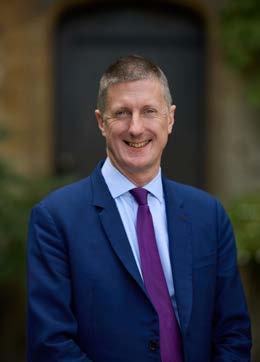

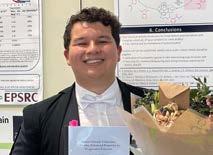
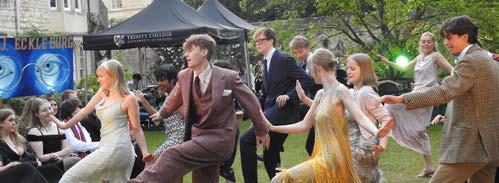
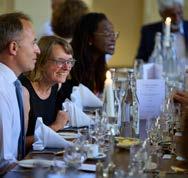

In looking back at Dame Hilary’s period as President, it sometimes feels no time since she arrived at Trinity.
While it’s true that her time here was a little shorter than the presidencies of her recent predecessors, let alone those from long ago, undoubtedly the past eight years, which have been packed with events and accomplishments, have raced by in what seems like a series of fast-changing developments.
Most striking from a visual perspective, and also for bringing a fundamental change to the life and work of the college, is the completion of the Levine Building. Begun by her predecessor, Sir Ivor Roberts, and taking more than 15 years in planning, the dream finally became a reality as it rose from the ground in little over a year. Using her skills and experience from the Royal Welsh College of Music and Drama, Hilary examined the plans carefully, ensuring that every detail was addressed so that the finished building could deliver all that it promised.
after the pandemic. Her total commitment to both students and the college as a whole, her great kindness and empathy, determination and courage, guided Trinity through this difficult period.
These same talents served equally well as Hilary strove to make Trinity as complete and ideal an environment as possible to promote learning and development, and to make this environment accessible to all who could flourish here, with the expanded Access & Outreach activities showing significant progress.

The Levine Building was swiftly followed by the rebuilding of the kitchen and refurbishment of the Hall—which quite literally involved strengthening the foundations of the college—moving on to the installation of ground source heat pumps and the creation of a new long border as part of the restoration of the gardens.
Hilary was acutely conscious of the impact this programme of work would have on students. However, the greatest disruption was entirely unexpected, and Hilary will always be the President who steered Trinity through the Covid pandemic. She led the college community, on site and at distance, through that unique period of fear, uncertainty and anxiety. A combination of reassurance and practical measures ensured that all were safe and cared for, during and
The return to normality after Covid lockdowns saw a further opening up of the college. The talks, discussions and musical performances that make up the Events at Trinity programme have caught the attention of a wider audience; this would have been unthinkable without the college’s magnificent new facilities.
Hilary didn’t do all of this alone; she had the support of a strong and committed team. However, she brought three particular strengths to her role: vision, because throughout her time as President, she was guided by a clear idea of what this college ought to be in the 21st century; seemingly boundless energy, which stood her in good stead for both her day-today duties as President and the special challenges of effecting transformation; and tenacity, which Hilary has in spades, to ensure that such major projects did not run aground.
Hilary will bring all these talents and strengths to the Weidenfeld-Hoffmann Trust. Trinity is left with a sense of gratitude for the work she has done here.
Based on the speeches given by Johannes Zachhuber, Vice-President, and Peter Strawbridge (1976, Chair of the Trinity Society 2020-24) at the Farewell Garden Party for the President in June
As Vice-President, I write on behalf of the Governing Body to say how delighted we are by the election of Sir Robert Chote as our new President. He writes here in anticipation of taking up the post.
Unfortunately, Robert has had to delay his arrival by a few weeks. In accordance with the statutes of the college, I have therefore been asked to perform the duties of the President until early November. We all very much look forward to welcoming Robert to Trinity then.
Professor Stefano Evangelista, Fellow and Tutor in English, Vice-President
It is a huge pleasure and honour to have been elected President of Trinity College. I am all too conscious of the trust that has been placed in me by the Governing Body and of the achievements of my 28 predecessors, not least Dame Hilary, who has been so generous and supportive in helping me prepare. I will do my utmost to serve the college well and I look forward to meeting our alumni and supporters whose engagement we treasure and to whom we owe so much.
Ever since I was first approached about this role, I have been struck by the friendliness and welcoming spirit of the Trinity community and by the shared desire to ensure this is a place where everyone supports each other to thrive and excel, not just in their work but in every aspect of the college’s intellectual, social, artistic and sporting life. Looking beyond our gates, we are living in an era that is anxious and unsettling in many ways, but one which is also filled with opportunity and the chance to be of service. This makes Trinity’s values of
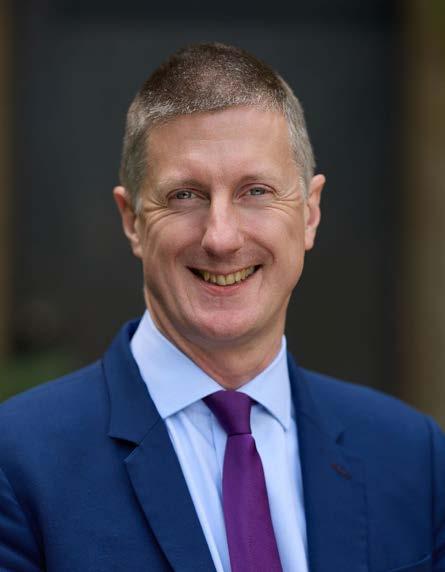
‘A real joy of coming to Trinity is to join a truly multi-disciplinary community. I look forward to discovering how little I know about so much, and helping to support our teaching, learning and research in every area.’
community and mutual support all the more important. Working with our Governing Body, I will do all I can to reinforce and build on them.
I come to this role having spent much of my career scrutinising and explaining to the public how governments manage their finances and run economic policy, in the hope of improving policy decisions and informing public debate.
I have been a journalist, I have led an academic research institute and I have served in various public bodies at home and abroad. I will maintain these interests, but a real joy of coming to Trinity is to join a truly multi-disciplinary community I look forward to discovering how little I know about so much, and helping to support our teaching, learning and research in every area. By way of background, I am a newcomer to Oxford, which adds to my sense of anticipation. I grew up and went to school near Southampton and then studied economics in Cambridge, journalism in London and public policy in Washington DC. I benefited hugely from these very different university experiences and want to ensure that this and future generations benefit from theirs as well. I am keen to ensure that Trinity attracts the best and brightest from every background, especially those that might not have thought that this was the place for them, and that once here everyone has a wonderful and rewarding time in all aspects of college and Oxford life. . Our students, academics, staff, alumni and supporters make this a rich and multi-layered community that I feel truly privileged to join, and to which I look forward enormously to contributing and knowing better. I will be joined in the Lodgings—on and off—by my wife Sharon and by my two student sons, Micah and Daniel. We are very grateful for being made so welcome and we look forward to becoming part of the Trinity family.
Trinity’s striking new door onto Parks Road, designed by Sir Antony Gormley, formally unveiled in March, is now in regular use and frequently drawing the attention and interest of passers-by. In May it was dedicated to Henry Moseley (1906), as part of a day commemorating one of Trinity’s most celebrated scientists.
The article on the new Parks Road door in the last edition of the Newsletter noted that the donors whose generosity enabled the college to commission the door, Roger Michel (1985, Sir Thomas Pope Fellow) and his partner Alexy Karenowska (a physicist and Fellow of Magdalen College), made the gift in honour of Henry Moseley.
Moseley was a Physics undergraduate at Trinity—a Millard Scholar—who came up in 1906 and was killed in action at Gallipoli in 1915, at the age of 27. Had he not lost his life during the First World War, it is widely thought that he would have been awarded the Nobel Prize for Physics that year. According to the Oxford Physics Department website,
During his short research career, he single-handedly carried out work of breathtaking originality, simplicity and significance. In a brilliant series of experiments, this young Oxford graduate established that the defining property of an element was the atomic number Z, the number of charges on its nucleus. This gave a physical basis for the periodic table of the elements, which had hitherto been ordered according to their atomic weights with empirical adjustments.
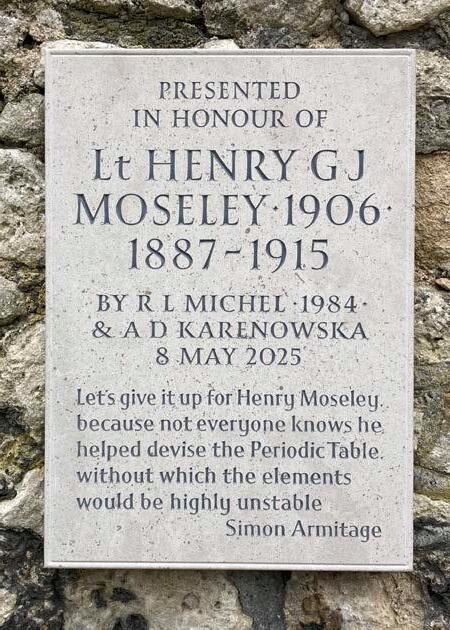
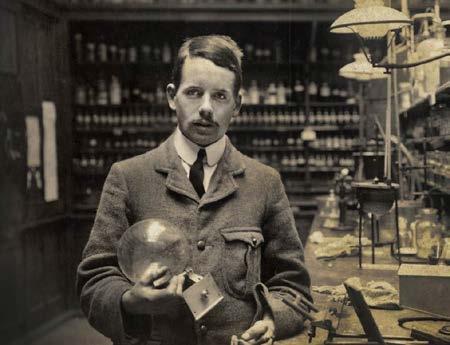
Roger and Alexy’s idea of honouring Moseley, which took shape over several months, came to fruition at a commemorative event on 8 May, in a collaboration with Trinity and the Department of Physics. After a service of remembrance in Trinity’s chapel, attention switched to the Physics department, where invited guests, academics and
students witnessed the unveiling of a portrait of Moseley and attended a series of informal talks.
Dedicating the Moseley Door
Back at Trinity, the dedication of the new door included the laying of wreaths and a programme of poetry including Laurence Binyon’s ‘For the Fallen’, and Robert Coffin’s ‘Crystal Moment.’ A new poem, a clerihew, by Honorary Fellow Simon Armitage was unveiled in homage to Moseley (see image, left).
A guest of honour at the dedication ceremony was Princess Elettra Marconi, daughter of the inventor of radio, Guglielmo Marconi, who won the Nobel Prize in Physics in 1909. Also in attendance were senior scientists from across the University and distinguished representatives from the Gallipoli Association, the Signal Corps, Summerfields School (which Moseley attended as a child), and the Loughborough RAF CCF.
Afterwards, a programme of music and poetry included the première of the Rust Symphony, by composer Hani Elias, derived from the actual sounds of oxidation. This performance was dedicated to Antony Gormley, whose works are characterised by carefully cultivated oxidised finishes. After an archive exhibition about the life of Henry Moseley, a dinner in Hall rounded off the day’s events. To commemorate the occasion, and in memory of Moseley’s own service and sacrifice, Roger Michel announced the creation of the Marconi-Moseley Scholarship for Science in the Service of Humanity.
After considerable disruption and upheaval, the gardens and lawns have been restored, and a dramatically redesigned long border planted, once again to be enjoyed by students, Fellows, staff and visitors, as Head Gardener Kate Burtonwood reports.
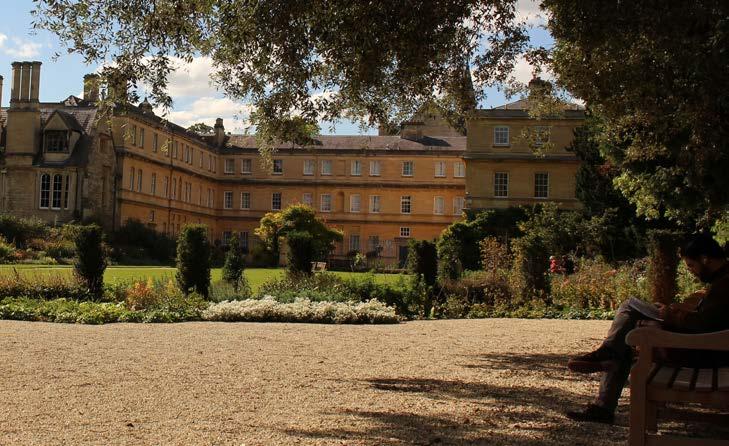
The transformation of the college gardens back to green space cannot have escaped anyone’s notice this spring and summer. Working to a design by Chris Beardshaw, the Gardens team oversaw the reinstatement of the lawns and landscaping of the new border, a transformative project made possible by the generous donation of Henry Shohet (1972) and his family.
With help from a couple of Trinity alumni who now work in garden design, Aparna Stachowiak (2003) and Freya Willetts (2009), the team planted over 5,500 plants in the new
border in just two weeks. The instant impact cheered the college community who had lived for six years without the historic gardens in place and thrilled visitors to college events and to our National Gardens Scheme Open Day in August (which raised over £5,000 for charity). The Gardens team may have wished for a well-deserved rest, but the autumn will see them add the 20,000 bulbs specified for the border which will give it its early spring impact.
There is more to the border than just the plants, designer Chris Beardshaw sought references from Trinity’s history and architecture. The shape of the border reflects the architectural proportions of Garden Quad
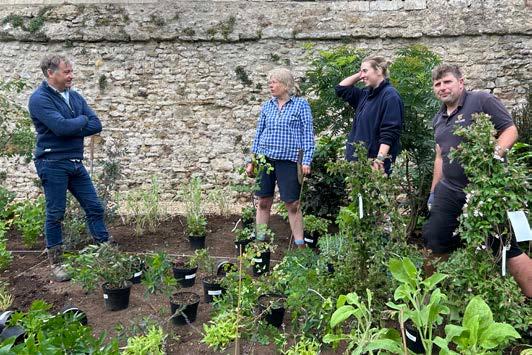
Chris Beardshaw, left, visiting Trinity during the planting of the border, with Cat Hennessy, a horticultural contractor, Hannah McKay, Gardener, and Aaron Drewett, Senior Gardener
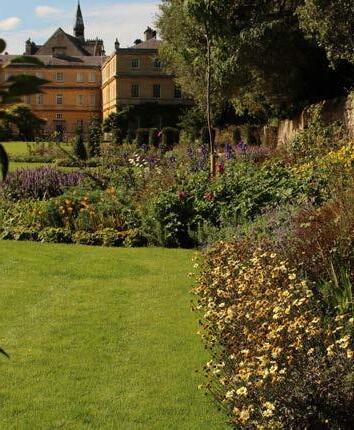
and the chapel, bringing the college’s baroque style into the garden. This is part of what makes the new design sit so well in this iconic space. It also recalls the grand garden design at Trinity in the early 18th century, when the garden was subdivided by a grid of paths into sections of lawn and topiary. Remnants of the main pathways were found during the archaeological dig on the back lawns in 2024. Chris felt elements in this design referenced the number seven, in the sections the area was divided into and counting other features which are represented in the famous Williams print of the gardens, and that this potentially referenced the seven virtues and Trinity’s Christian foundation. The seating area is therefore flanked on each side by seven Taxus baccata (English yew).
Initially, the new garden will struggle, having been planted just before a summer of drought and heatwaves, but the team have done an excellent job in the adverse conditions, doing what they can to help the garden establish and endure. We very much hope to see even more fireworks from it in 2026 and beyond.
The appeal to raise money to endow a graduate scholarship in the name of Dame Hilary Boulding got off to a strong start and by the end of Trinity term, over £450,000 had been received in gifts and pledges. During the summer, a further boost came in the form of a promise of matched funding from the University—in order to receive this additional money, which would create a fully endowed scholarship, the college has to secure £1,546,000 in donations by the end of July 2026.

The appeal has been enthusiastically endorsed by Fellows, students and staff, who contributed to a series of videos that explore the importance of the Humanities and Music in College. The first, sent to all Old Members and Friends at the end of August, looks at the immense contribution that Hilary has made to the college and considers her legacy. Please look out for two further videos, on the Humanities and Music, which we will share in the coming weeks.
We are also sending a letter asking Old Members and Friends to support the appeal, and when people are invited to make a donation when booking for an event, this is the fund that we hope they will be happy to support.
Hilary saw how the squeeze to external funding for the Humanities makes it impossible for some students to take
up the places they have been offered, and she recognised what a loss this is to the college, the University and ultimately, the wider community. Graduate scholarships remain a priority not just in Trinity, but across the collegiate University.
Undergraduates at Oxford who face financial hardship receive generous support packages, but it continues to be so much harder for graduates to find the funding they need.
We have now raised £625,000 and could not be more grateful to everyone who has already made a contribution; thank you again. Gifts of all sizes will help us to reach the target and as well as one-off gifts, we welcome regular monthly, quarterly and annual donations. If you would like to learn more about the scholarship, please look at trinity.ox.ac.uk/hb-scholarship and if you would like to make a contribution, please go to trinity.ox.ac.uk/make-gift or get in touch to discuss your gift.
There’s no question that raising a further £920,000 in the coming months is a challenge, but we are confident that Old Members and Friends will do all they can and that they will be united in their wish to support talented young people and recognise the contribution Hilary has made to the college.
The Vatican has announced that Pope Leo XIV will declare St John Henry Newman (Scholar 1816, Honorary Fellow 1877) a Doctor of the Church, one of the Catholic Church’s highest honours. The ceremony formally making the declaration will take place on 1 November.
John Henry Newman was an undergraduate and scholar from 1816–22, and Trinity’s first Honorary Fellow. He made a deep impression on his tutors for the clarity of his thinking, breadth of knowledge, and appetite for learning. He excelled in the scholarship examination and won prizes for his ability and diligence in both classics and mathematics. He also devoted himself to religious services and the study of scripture. After his graduation, he came first in a highly competitive examination to be elected an official fellow of Oriel College, where he proved himself an extremely effective and influential teacher and early proponent of Oxford University’s renowned tutorial system.
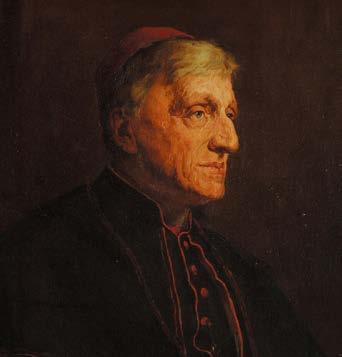
As a theologian and poet, Newman is a significant figure in the religious history of 19th-century England; his role in the Oxford Movement (which hoped to return many pre-Reformation Catholic beliefs and rituals to the Church of England) and his eventual reception into the Roman Catholic Church made him a nationally known figure by the mid-1830s. He is remembered as a preacher, educational visionary, and one of the most significant modern theologians of the Roman and Anglican churches.
The title of Doctor of the Church is reserved for people whose writings have greatly served the universal Catholic Church. Only 37 people have been given the title since Pope Boniface VIII formally declared the first four Doctors of the Church in 1298. Those 37 include St Augustine of Hippo, St Francis de Sales and St Teresa of Ávila. Newman is not the first Englishman to be honoured; the Venerable Bede (c.673-735), who is depicted in one of Trinity’s chapel windows, was declared a Doctor of the Church in 1899.
Trinity’s Access work has been recognised at the ViceChancellor’s Awards, which celebrate achievements and successes across the University, as the Outreach and Access team won in the Local Community Engagement category for its outreach in Oxfordshire (briefly reported ‘Stop Press’ in the last edition). The award was presented by the Vice-Chancellor (pictured, left, with Access team members Innocent Otunnu, Hannah Rolley, and Rob Harrison) at a special ceremony at the Sheldonian Theatre in May.
Each year the Access team engages with thousands of young people, from primary school to Year 13, to bring them into contact with the University. The team shared the award with the Oxford Young Sport Leaders Programme (OYSLP), run by the Oxford SDG Impact Lab and supported by Trinity’s team as part of the college’s work as regional outreach partner for Oxfordshire.
Also winning an award was Aurelia Annat, Lecturer in History, as part of the team that won the Innovative Teaching and Assessment Award for delivering the Astrophoria Foundation Year. Trinity is one of the colleges participating in the Foundation Year scheme, which offers a year-long, fully-funded programme for UK state school students with severe personal disadvantage and/or a disrupted education.
In June, Trinity joined with the University’s Mathematical, Physical and Life Sciences (MPLS) Division to welcome enthusiastic Year 5 pupils from local state primary schools for two days packed with exciting, handson scientific workshops.
The MPLS Primary Science Days are part of the Oxford College Twinning Project, one of the initiatives detailed in a report published earlier this year setting out the University’s plans to support positive social, economic and environmental change in the city and county. The programme partners local state schools with Oxford colleges to enhance educational opportunities and foster community relationships.
The event, also involving St John’s, St Anne’s, and Lincoln colleges, offered an opportunity to explore various scientific disciplines through dynamic workshops tailored to complement the school science curriculum. Highlights included Chemistry’s ‘Chemical Clocks’ workshop, in which participants learned to investigate chemical reactions using hands-on experiments, and the engaging Computer Science session, featuring spherical robots that the pupils programmed and controlled. The Earth Sciences department introduced them to fascinating fossils, while the Biology team arranged for them to examine insects through microscopes. After the workshops, a captivating lecture-demonstration in Trinity’s de Jager Auditorium
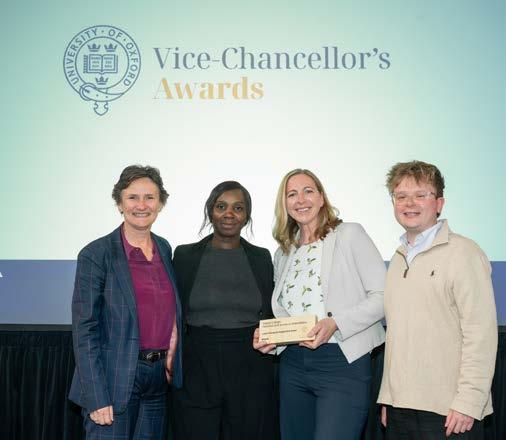
to ensuring that the very best students from all backgrounds come to Oxford, and that we share the academic resources of the University for the benefit of our local community and wider society.
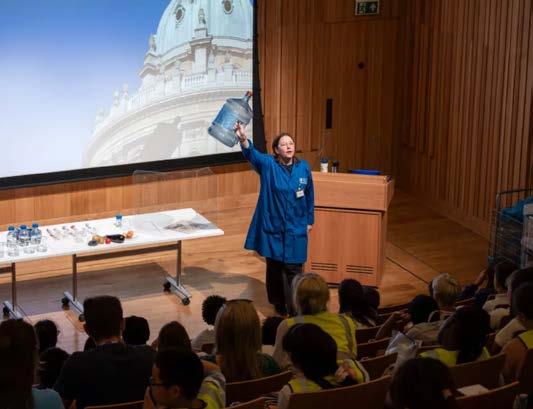
provided a grand finale to the programme of activities (pictured).
Trinity was delighted to be working with colleagues across the MPLS division to showcase the breadth of science happening at Oxford, and show young people how exciting it can be to study science at university. As link college for Oxford and Oxfordshire, Trinity takes seriously its commitment to offering activities that help raise attainment in and around Oxford, and to ensuring our local community has access to some of the inspiring resources of the University.
Lilly Liu, Fellow and Tutor in Engineering, is leading a team that will play a key role in a major new programme aiming to transform the lifecycle of graphite in nuclear energy.
The five-year ENLIGHT (Enabling a Lifecycle Approach to Graphite for Advanced Modular Reactors) programme will develop vital technologies to support the deployment of next-generation nuclear energy technology. This will have a critical part to play in the UK’s net zero goals, since nuclear energy greenhouse gas emissions are nearly zero, but it comes with challenges.
ENLIGHT will address two of the most pressing issues: the need to secure a sustainable, sovereign supply of nuclear graphite, and finding solutions to manage the country’s growing volume of irradiated graphite waste.
Led by the University of Manchester in collaboration with Oxford, and the universities of Plymouth and Loughborough, ENLIGHT is supported with an £8.2m grant from UK Research
Two tutorial Fellows have been recognised in the University’s annual Recognition of Distinction scheme, which confers the title of full professor on academic staff who meet the set criteria in each of research, teaching and ‘good citizenship’.
Melanie Rupflin, who teaches pure mathematics and whose research focuses on partial differential equations and variational problems that are inspired by questions from geometry, has been awarded the title of Professor of Mathematics.
Sam Vinko, who has the title of Professor of Physics,
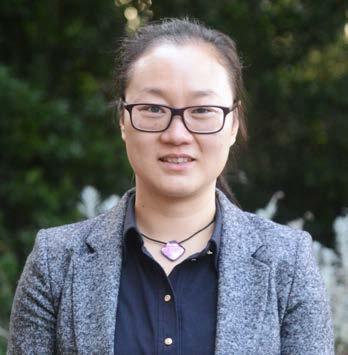
and Innovation’s Engineering and Physical Sciences Research Council (EPSRC) with around £5m of contributions from industry partners. The programme aims to secure the UK’s position at the forefront of nuclear innovation and as a global leader in advanced reactor technology and clean energy innovation.
The Oxford team, led by Dr Liu and Professor James Marrow of the
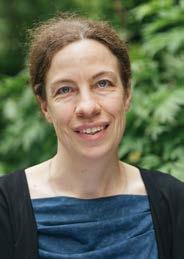
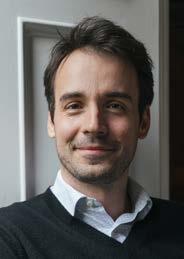
teaches undergraduate Physics with a focus on the mathematics courses, Optics, and Atomic and Laser Physics. His research focuses on the investigation of high energy-density plasmas using a wide range of experimental and theoretical techniques. He is part of a multiinstitutional team industry partnership exploring a new method for creating fusion power that it hopes could eventually be scaled to provide safe, clean, and abundant energy.
Department of Materials, will lead one of the three core strands: developing and selecting new types of recycled and sustainable graphite materials engineered to withstand extreme conditions in Advanced Modular Reactor (AMR) environments. The team’s research will lead to computerbased models to predict how these materials will perform over time.
Graphite is a critical component in many next-generation AMRs that will play a key role in achieving the UK’s ambition to deliver 24GW of new nuclear power by 2050. The material accounts for around one-third of reactor build costs, and the UK currently relies on imports.
With the current Advanced Gas-cooled Reactors nearing decommissioning and over 100,000 tonnes of irradiated graphite already stored, ENLIGHT will develop new methods to recycle legacy material and produce sustainable, high-performance graphite for future AMRs.
Sir Andrew McMichael (Professorial Fellow 1983-2000), Honorary Fellow and Professor of Molecular Medicine at the Nuffield Department of Medicine, has been elected an international member of the United States’ National Academy of Sciences (NAS).
Members are elected to the NAS in recognition of distinguished achievements in original research, and membership is a widely accepted mark of excellence and one of the highest honours in the scientific community. NAS membership currently stands at approximately 2,700 members and 500 international members, of whom around 200 have received Nobel prizes.
Professor McMichael, who has made a major contribution to the understanding of human immune response, has served as director of the Weatherall Institute of Molecular Medicine and founded the MRC Human Immunology Unit. He has mentored over 55 doctoral students, many of whom have become leading immunologists.
Recent DPhil graduate and former Trinity MCR president Kam Poon (2020) has been named winner of the 2025 Jon Weaver PhD Prize for the best PhD in polymer chemistry by the Royal Society of Chemistry (RSC) and Macro Group.
The award is given annually to a PhD student who has displayed an outstanding ability across a range of criteria throughout their PhD in the field of polymer science.
Kam received his DPhil in 2024 and was supervised by Professor Charlotte Williams, former Fellow, now Honorary Fellow. His thesis, ‘Carbon Dioxide Utilisation: Unlocking Enhanced Properties for Oxygenated Polymers’, explored the synthesis of novel oxygenated plastics and elastomers from CO2 and bioderived feedstocks, utilising controlled
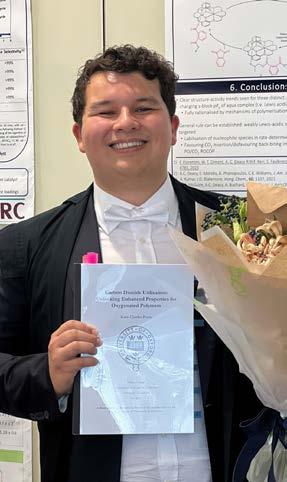
The latest MCR Showcase, a regular event in which members of the MCR and SCR give short, four-minute research talks, took place in May. Topics ranged from ‘Atomistic simulations to understand the evolution of fusion materials’ (Anirvinya Tirumala, DPhil Engineering), ‘Spatial inequality in access to urban infrastructure in India’ (Teres Vattoly Sajeev, MSc, Social Policy and Intervention—pictured right) and ‘Old Russian vs formal syntax’ (Anna Fitiskina MSt Linguistics, Philology & Phonetics), to ‘The politics of salvation— liberation theology and its critics’ (the Chaplain).
polymerisation techniques to design high-performance materials with tailored thermomechanical properties.
His research addressed a key challenge in sustainable polymer chemistry: how to design high-performance, recyclable materials from CO2-derived and biobased monomers, while maintaining competitive mechanical properties.
Through precise control over polymer microstructure, he demonstrated how non-covalent interactions—such as ionic crosslinks and hydrogen bonding—could be harnessed to significantly enhance the toughness and elasticity of these materials. This approach led to the development of recyclable thermosets with applications in soft robotics and additive manufacturing.
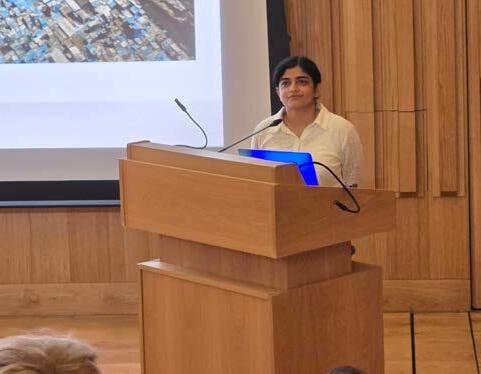
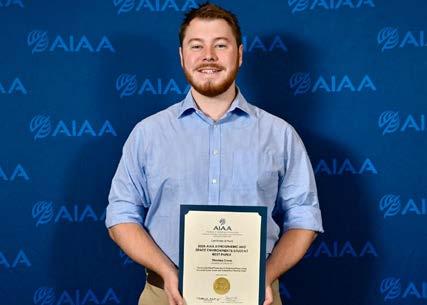
Thomas Cross, a DPhil student in Engineering, is the lead author of a paper that has enabled the Oxford Thermofluids Institute to achieve a rare double success in winning the Best Student Paper Award at the American Institute of Aeronautics and Astronautics (AIAA) Aviation Forum for the second year running (see Trinity Newsletter summer 2024). The paper was co-authored by Natan Zawadzki and Professors Matthew McGilvray and David Gillespie.
The award highlights the University’s world-leading work on aircraft engine icing—a critical challenge for flight safety and the next generation of efficient propulsion systems. Work on the research for the paper, ‘Ice Crystal Shed Prediction in Turbomachinery Using Accretion Laser Scans and Subsurface Thermal Data’ was supported by the Engineering and Physical Sciences Research Council, Rolls-Royce and Trinity.
Contributions to the life of the college and the JCR have been recognised in two annual awards.
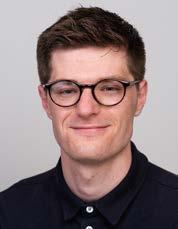
Jack Warburton, a DPhil student in Sociology, has won the Stirling Boyd Prize, which is awarded annually to the student whose attainments and influence on the life of the college are, in the opinion of the President and Fellows, of the highest value. Jack’s nominations recognised his involvement in student life as Junior Dean, helping out in the Lodge, giving talks before the Benefactors Lunches, and organising a charity football tournament in memory of Wayne Shorter, member of the workshop team, who died last year (see opposite).
Mahima Nayak, an undergraduate in Law, was given an honourable mention for the Stirling Boyd Prize in recognition of the
Richard Hillary Prize
Undergraduates Camilla Berarducci, a first-year studying English and Modern Languages, and Leelou Lapteva, a fourthyear Classicist, have shared first prize in this year’s Richard Hillary Prize for creative writing; Camilla for her short story ‘The Rock’ and Leelou for a poetry collection ‘The Art of Life’.
The competition was established in memory of Richard Hillary (1937) author of The Last Enemy, which was a best-seller during the Second World War. The prize, worth £500, is awarded for the best piece of creative writing by a Trinity student.
This year’s competition was judged by Elleke Boehmer, Professor of World Literature in English and a fellow of Wolfson College, and Trinity’s Fellows in English, Dr Kantik Ghosh and Professor Stefano Evangelista. Both winning stories are available to read on the website.
Douglas Sladen Prize
The Douglas Sladen Prize has been awarded to Q Le, a third-year undergraduate studying Maths.
The prize, established in 1964 by the widow of Douglas Sladen (Scholar 1875), is awarded to the best original written essay on any topic by a Trinity undergraduate.
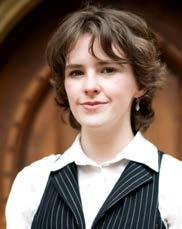
many roles she has undertaken in college, including as JCR president and Access student ambassador, where she has been an exemplary ambassador for the college through her outreach work.
Isabelle (Izzy) Moore, an undergraduate in English, has been given the David Evers Prize by the JCR. The prize was established by an anonymous Old Member in memory of David Evers (1959). The prize is awarded annually by election by the JCR to one of their number who ‘best exhibits the fellowship, sportsmanship, character, generosity and good-humour which gives substance to the distinctive Trinity style’.
Izzy’s contribution to the artistic life of the college, in particular through Arts Week and the Trinity Players was cited in her nomination.
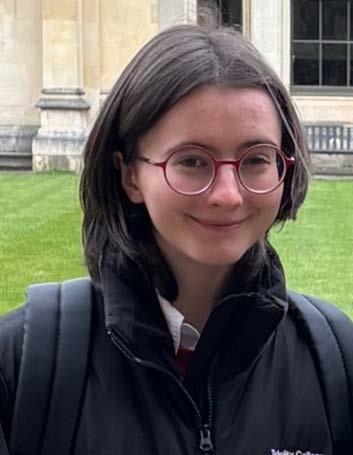
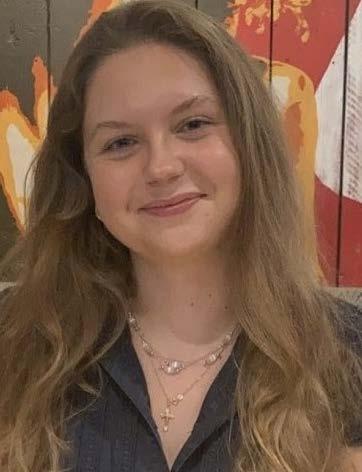
Q’s essay is entitled ‘Understanding Anna: Sex Robots, Artificiality, and the Programmed Patriarchy’. The runners up were Briony Arnott and Agnieszka Gryguc.
Margaret Howard Essay Prize
The Margaret Howard Essay Prize has been won jointly by third-year English student Euan McBride and first-year chemist Sahil Grover.
The prize was founded with the intention of setting essay topics that are not subjectspecific to encourage students reading for an undergraduate degree in any field to exploit the knowledge they have gained during their course and prompt them to think about the social and ethical context in which it is studied. It is awarded for an essay addressing topics chosen by the judging panel on one of the following themes: Heat; Memory; Land; Singularity; or Artifice.
Euan McBride addressed the theme of singularity with his essay ‘Too “Singular” for the “Technological Singularity”?: How an aesthetic emphasis on medium might inform our understanding of AI “creativity”’; Sahil Grover addressed the theme of heat with his essay, ‘Can the concepts within thermodynamics and cosmology that explain “heat death” be used to model generative AI’s future?’
On 25 May Trinity held a football tournament in memory of Wayne Shorter, a valued member of the maintenance team, who died in January 2024. A passionate football fan, Wayne coached his son’s team and played for Trinity against visiting summer schools.
The tournament was organised by Jack Warburton, DPhil student and Junior Dean, and saw staff, students and Fellows form six-a-side teams, with entry fees to raise funds for Leukaemia UK.
The tournament took place at the sports ground on Marston Road and was followed by the annual college barbecue.
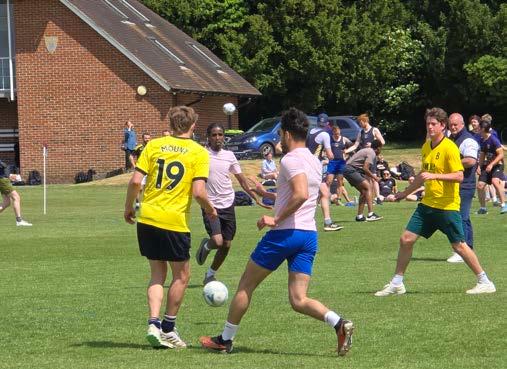
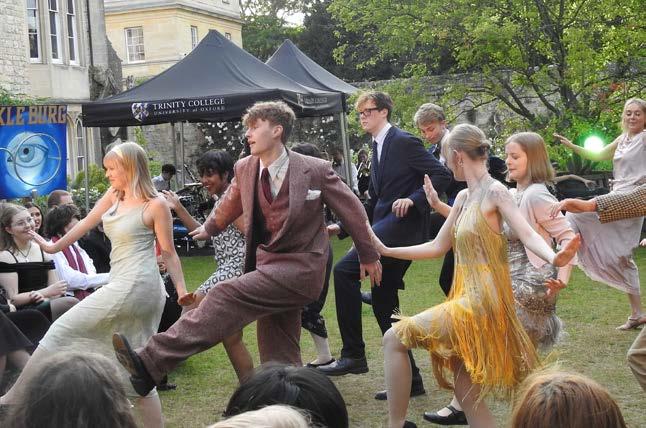
The centenary of the first publication of The Great Gatsby, reported on in the last edition of the Newsletter, has been marked with further events exploring or celebrating the novel’s connections to Oxford and Trinity.
F Scott Fitzgerald’s The Great Gatsby, first published in April 1925, has an intriguing connection to Trinity. Its eponymous hero, the shadowy and mysterious Jay Gatsby, likes to tell people that he has been ‘at Oxford’, and to prove his connection to the University, he produces a photograph of himself, with a cricket bat, which he says was ‘taken in Trinity quad.’
The Trinity Players naturally chose Simon Levy’s The Great Gatsby for their summer production, co-directed by George Loynes and Izzy Moore, and performed at the end of May to sell-out audiences in the President’s Garden. Though faithful to Fitzgerald’s original text, the production re-imagined the story through ensemble-driven, expressive physical theatre, complemented by a live jazz band performing original compositions. Framed through the perspective of narrator of the novel, Nick Carraway, the production explored the tension between observation and participation, with the ensemble reflecting Nick’s fragmented and unsettled gaze. The cast included Dominic Murphy-O’Connor as Jay Gatsby, Alexander McCallum as Nick Carraway, Isabel Clarke as Daisy Buchanan, and Gillies Macdonald as Tom Buchanan.
To coincide with the Trinity Players’ production, college archivist Clare Hopkins reprised her exhibition, ‘Gatsby at Trinity—the evidence.’
The exhibition looked at historic evidence from the college’s archive to explore four key questions: Where could Gatsby’s photograph have been taken? Who might have taken it? How did an American get to Oxford in the 1920s? and, Could Gatsby play cricket?
The exhibition was intended as a light-hearted opportunity to step back in time to explore Trinity as it would have looked when F Scott Fitzgerald visited Oxford in 1921, and consider the evidence for Gatsby being a member of Trinity, which was presented in the form of documents and photographs from the college Archive. Was Gatsby telling the truth? A survey of visitors to the exhibition showed ‘yes’ clearly ahead until just before the end, when a late flurry of votes for ‘no’ swung it the other way!
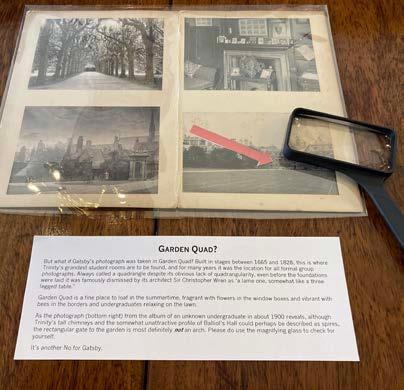
The considerable task of safely archiving Trinity’s borndigital records and backlog of modern files has been progressing steadily under the guidance of the new member of the archive team, Kathryne Crossley, Digital Archives and Records Manager.
In Trinity term some pioneering work in widening the scope of the digital archive was initiated by the MCR Secretary, Adrian Chun Kwong. Adrian has been proactive in preparing minutes, posters and other MCR records ready for transfer to the University-run digital vault Digisafe. In Hilary term he also spoke at the MCR showcase event in the de Jager Auditorium to encourage MCR members to consider sharing their own records of life in Trinity with the college Archive.
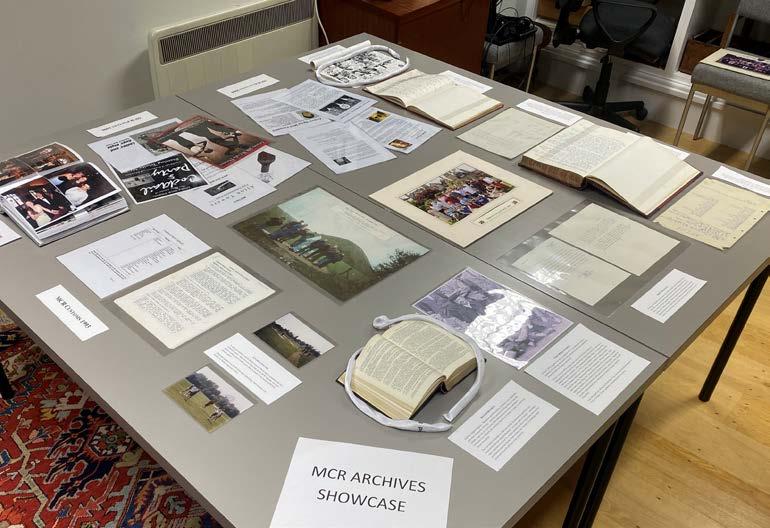
combined a display of photographs and documents in the archive reading room, with an adjacent drinks party in the Upper SCR. Here, members of the MCR were able to meet the Fellow Archivist, Katherine Ibbett, Archivist Clare Hopkins, and Kathryne Crossley, and to discuss how they themselves might help preserve records of events and activities they had been involved in. So successful was the event that it is hoped to make it a regular occasion in the calendar.
As a means of supporting this endeavour, we took the opportunity to celebrate the MCR’s history with a special event that

We would like to widen the invitation to past members of the MCR as well. Physical archives, such as newsletters, circulars and posters are always extremely welcome, but we would be particularly interested to hear from anyone who would like to share digital records of Trinity, including, but not limited to, photographs. Please get in touch with Kathryne directly if you would like to help, or to learn more about how digital files are accessioned, arranged, protected and preserved.
Clare Hopkins, Archivist

Alumni vs student tennis match
In June, a team of current students took on a team of Old Members in the annual match at the college sports ground, organised by Matthew Johnston (1999) and supported by the Trinity Society. See report on page 24.
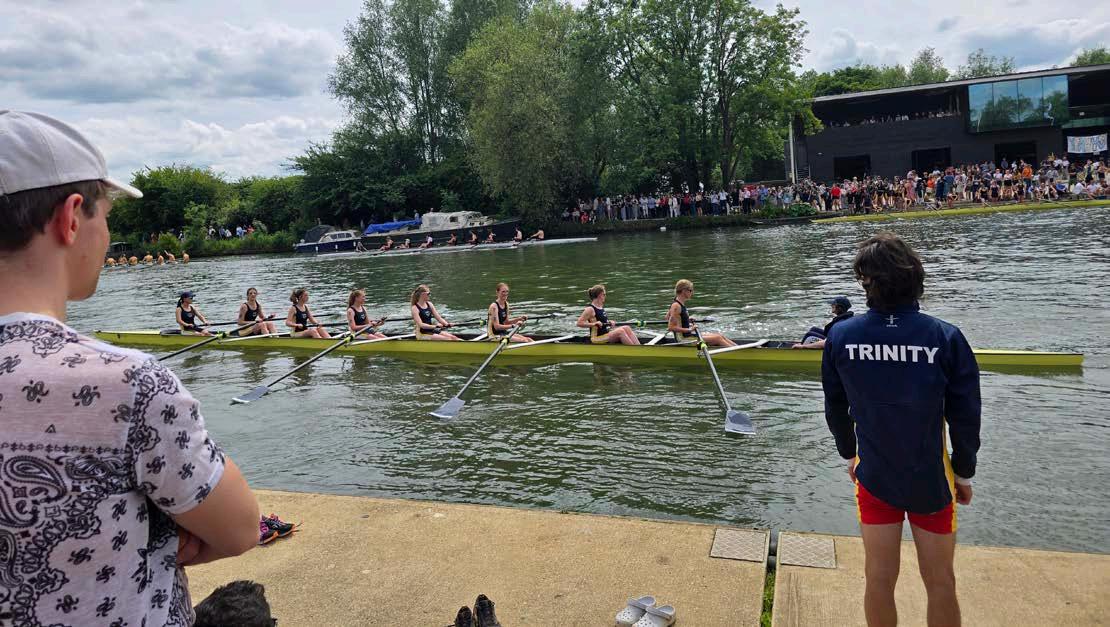
This year’s Summer Eights brought some exciting racing. The women started the year with an almost completely new squad, and did an excellent job in getting three boats out for Summer Eights and to have two of them qualify—but it was a tough competition and W1 ended the week -4 and W2 went -3. It’s hoped they will hit the ground running next year with a more experienced squad.
The men’s 1st VIII bumped Wadham on day 1, rowed over on day 2, bumped Teddies on day 3, and—perhaps the best end they could ask for—bumped Balliol on the Saturday. This brought them up to 9th on the river and +3 over the campaign. M2 did not qualify, however there are plenty of novices ready to challenge for the M1 crew next year, and hopefully the good form will continue.
In May, M1 raced in the Worcester Regatta and, after defeating a strong Evesham crew in the final, managed to come home with the Op 8+ trophy.
In August, a few TCBC members competed in the

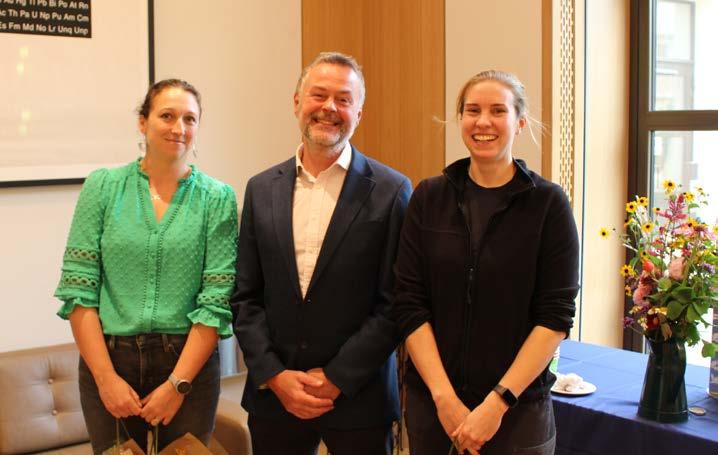
In September, Julia Paolitto, Head of Communications, left Trinity to return to the University offices and take up the role of Deputy Head of University Communications. Julia came to Trinity in 2018 as the first Head of Communications, and amongst a raft of initiatives, she oversaw a collegewide re-branding project and a new website; helped to promote the college
externally and within the University; organised celebrations to mark different cultural festivals; and curated a swathe of the Events at Trinity programme. During COVID, Julia’s work was vital to keeping everyone safe and she also masterminded ways to support those isolating.
Also leaving in September, Hannah McKay has moved to a new role
For the second year in a row Trinity has been awarded a Green Impact Beyond Gold award from the University for its efforts to make the college more environmentally sustainable. Beyond Gold is the highest level of award in the Green Impact scheme. Trinity, one of five colleges to win Beyond Gold this year, was recognised for its work promoting sustainable practices and achieving its strategic environmental goals.
The Oxford University Environmental Sustainability team’s Green Impact awards is an environmental engagement scheme in which staff and students come together in teams to make their workplaces more sustainable.
Trinity is delighted to retain the Beyond Gold award again this year. Lynne Adam, Domestic Bursar, explains, ‘It certainly feels that we have made significant progress since we set up our sustainability committee in 2019. The Green Impact scheme is an extremely helpful tool, not only in identifying priorities and measuring success, but also in successfully providing a framework to bring together sections of the college community (including staff and students) on
as a Senior Gardener at Worcester College, joining the team led by former Trinity joint head gardener, Simon Bagnall. Hannah came to Trinity as an apprentice gardener in 2021, completing her apprenticeship with distinction. She stayed on in a permanent role and brought much to the gardens with her artistic approach and enthusiasm for outreach and student activities. She helped sculpt many of our roses into better shape and flowering. She has been succeeded by Neil MacNamee, who was previously at Waterperry Gardens and had volunteering roles at the Botanic Garden and the National Trust’s Greys Court, who will take on the new border and student engagement in his role.
In August, we welcomed back Louise Kernahan, Head of Events, when she returned from maternity leave following the birth of her second daughter, Lily, last year.
Earlier, in May, Joanne Morgan joined the Events and Conference Team, in the new role of Senior Conference and Events Manager. Jo has previously worked in events management at Wadham College and the Oxford Union.
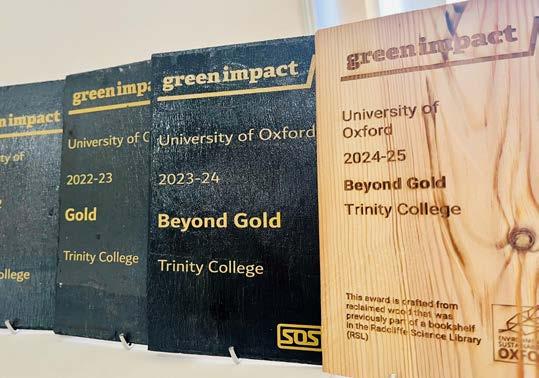
a number of projects and initiatives.’
This year the college completed ground source and air source heat pump projects along with several separate insulation projects. There has also been a focus on gathering baseline data, as Trinity plans its priorities for the coming year.
Two members of Trinity have won awards at the University’s Sustainability Photographer of the Year competition.
Sara Reevell, Facilities Officer, won third place for her photo of a murmuration of starlings at Oxford Business Park, while DPhil student Lars Bathe-Peters was one of two runners-up, for his photo of a squirrel dangling off the edge of a pool to drink.
This year’s competition was on the theme ‘It made me think,’ and invited

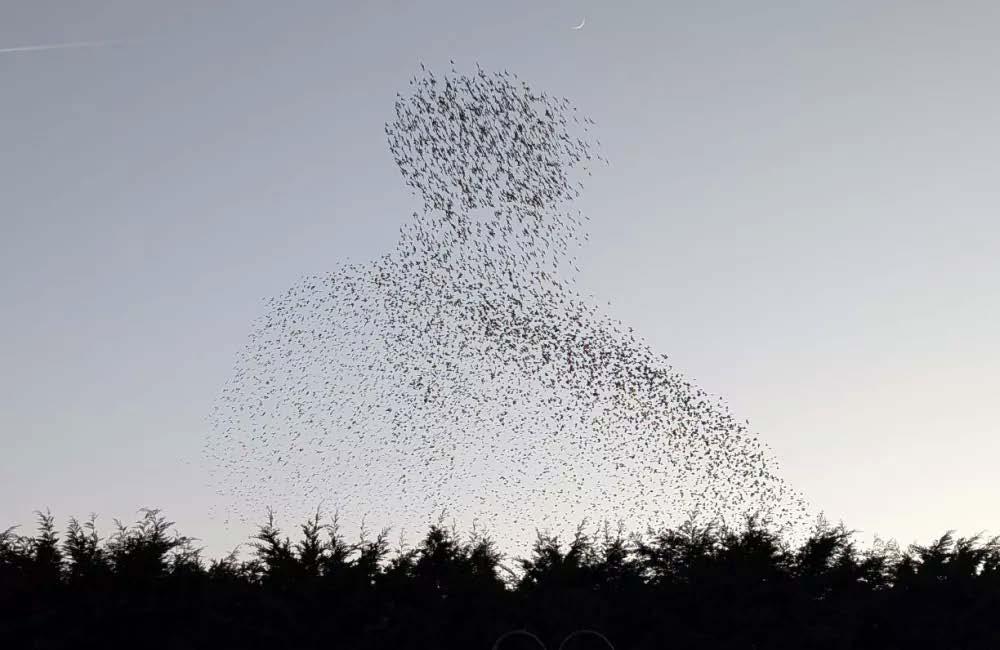
participants to share images that inspire reflection and spark conversation around sustainability. More than 140 entries were received in this year’s competition, and the awards were announced at the University’s Sustainability End of Year celebration at Osler House in June.
Sara named her image ‘Is it a bird?’, and described it as, ‘The fantastic experience which is the murmuration of starlings, happening in the trees bordering a car park in the Business Park in Cowley. It is an amazing sight, especially in such an urban setting—the speed of movement and build-up of numbers of birds, the shapes they create.’
Lars’ photos, titled, ‘Just Enough to Drink—Sustainability isn’t just our burden’, show a squirrel putting a lot of effort into drinking water. Lars explained that it made him think about resources becoming scarcer in a less sustainable world.

Several no-mow patches have been left to grow on the Front Quad lawn this year. Although they have not grown very high due to the hot and dry weather this summer, in June the gardens team were very pleased to see a pyramidal orchid (Anacamptis pyramidalis) appear in one of the patches.
Clare Hopkins, Archivist, considers Trinity’s return to peacetime in 1945 and, 80 years on, reflects on the remembrance of the college’s fallen in the Second World War
Oxford marked the end of the Second World War somewhat differently than it had the First. In 1918, the Armistice was declared on 11 November; it was the middle of term, and the colleges were crowded with army cadets or war office personnel. The end of the second great conflict of the 20th century, however, was not so clear cut. Victory in Europe Day had been widely celebrated on 8 May 1945, but the fighting continued in the Asia-Pacific theatre of war. On 6 and 9 August, atomic bombs were detonated over Hiroshima and Nagasaki, and five days later, the Japanese imperial forces accepted the Allies’ terms of surrender.
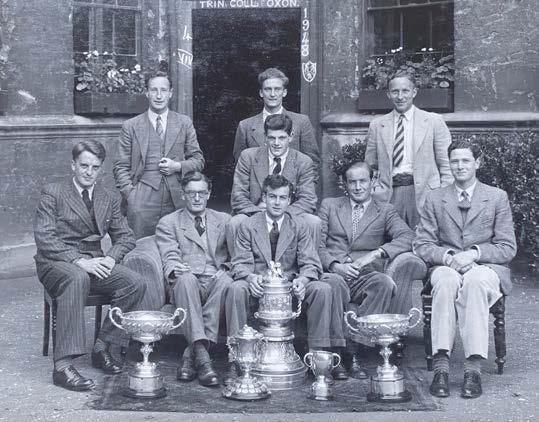
them that I found my soul. I realised that once again I am an undergraduate…’
The fallen were never far from people’s minds. The President chaired a War Memorial Committee of fellows, alumni and current undergraduates, including Richard Wakeford, VC, who had matriculated as a medical student in 1939, and returned to complete his degree in 1946.
At midnight on 15 August, the news was announced on the radio. August 15 was declared as Victory over Japan Day, with 16 August as a second bank holiday. Jubilant scenes were observed in London and elsewhere, but there is no record at all of celebrations in Trinity. It was the dead of the Long Vacation. There were no undergraduates in residence and just a single senior member, who was taking his meals in St John’s.
More than a year later, in December 1946, the President, J R H Weaver, reported, ‘there is little doubt that the further transition to approximately normal conditions will occupy at least another two years.’ In Michaelmas term 1946 a massive bulge of 194 resident undergraduates included 126 ex-servicemen.
Stephen Cooper’s diary
One who participated in that transition to peacetime was Stephen Cooper (RAF Cadet 1943) who in 1992 deposited his undergraduate diaries in the college Archive. Stephen was in Africa when he heard the news of VJ Day, ‘at breakfast… At last after a week of waiting the Japs have surrendered and there is Peace in the World.’ It was not until October 1946 that he was demobbed and able to return to Trinity. His diary records a humdrum routine of life in chilly lodgings and cheap meals in British restaurants as the college coped with inflated student numbers. Only in February 1947 did he feel fully at ease: ‘The great thrill of this term was the Torpids races, and I think it was with
Trinity’s fallen in the Second World War number 133 men. The oldest, Frank Witts (1906), 56, had served with distinction on the Western Front in 1914-18, and as Commander of the 8th Infantry Brigade 1937-40; he succumbed to heart failure in May 1941 while on active service. The youngest, John Swain (1942), died in December 1943 aged 19 years and 4 months, in a tragic training accident at Sandhurst. Arranged by year group, their names were painted in gold on a Roll of Honour, at the foot of which was inscribed, in Greek, a line from the orator Hyperides (c. 392-322 BC), ‘Never have men fought for a nobler cause or against a stronger enemy or with so few on their side.’ It was placed with great ceremony in the entrance to the War Memorial Library, which had opened in 1928 as a lasting memorial to Trinity’s fallen in the First World War.
In the 1960s the boards from both conflicts were moved inside the main library itself, as the original entrance was remodelled to fit in with the modern style of Library Quad. This summer, as Britain marked the 80th anniversary of the end of World War Two, the Library entrance is now in its third incarnation. The new foyer, opened in 2022, links the Library’s traditional interior with the modern facilities of the Levine Building. However, the classical lines of the bookcases and the fine oak tables within would be instantly recognisable to an undergraduate of almost a century ago. The forward-looking aim of the 1939-45 War Memorial Fund was to endow bursaries that would make an Oxford education possible for those who could not otherwise have afforded it, and the members of President Weaver’s committee would surely be proud and amazed to see the industry and diversity of the undergraduates studying in the library today.
In 2018, Trinity was pleased to take on a charitable trust that was established in memory of Sir Peter Kirk (1946), following his untimely death in 1977. Sue Broers, Director of Development explains the background to the trust, which has been providing travel scholarships for over four decades.
When Trinity Old Member and MP for Saffron Walden, Sir Peter Kirk (1928-1977), died suddenly, his family and friends were determined to honour his memory and further his desire to promote accord with Britain’s European neighbours.
Peter studied at Trinity and obtained an MA in Modern History, having first studied Modern Languages. He was a journalist before being elected to Parliament in 1955, where he served as Under-Secretary of State for Defence (1963-64 and 1970-72). He led the first delegation of British MPs to the European Parliament, of which he was a member from 1973 until his death. In a moving tribute written for Trinity by his widow, Lady Kirk wrote that as part of the immediate post-war generation, Sir Peter ‘....was swept off his feet by Churchill’s vision of a United Europe.’
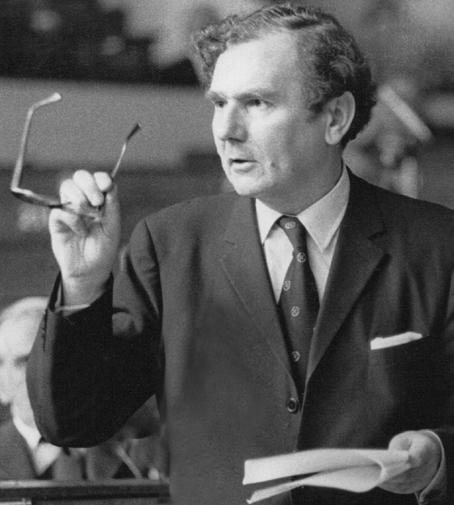
‘This brings Peter Kirk’s permanent memorial back to the place where so many of his ideas were formed, and his skills honed. Back to the place where I first met him. And it will enable a new generation of Peter Kirk scholars to benefit from the generosity of those who wished his life and his beliefs to be remembered.’
Lady Kirk
at Oxford, and others include journalist Mishal Husain and human rights lawyer Philippe Sands. For 40 years, the trust, which consisted of members of the Kirk family—including Peter’s son, David (1974)—and external trustees, managed the fund, but in 2018, it was passed to Trinity.
Following his death, Sir Peter’s family received donations from colleagues in all political parties, constituents, businessmen, churches, industrial charities and local authorities, and the money was put in a trust to fund scholarships for young people who wished to travel within Europe. The aim was to promote a greater understanding of Europe and scholars were required to research any aspect of modern European culture.
One of the early Kirk scholars was Martin Conway, who is now Professor of Contemporary European History
‘I think the Peter Kirk Travel Scholarship is one of the best awards in Oxford. It gives you the freedom to pursue things you’re curious about but might not otherwise do. The award enabled me to travel meaningfully, build some excellent, long-lasting international connections, and have a good break from my PhD to do something completely different.’
Ishbel Henderson, Travel Scholarship recipient
The travel award at Trinity Scholarships are available to students, aged 17 to 30, currently studying at the University of Oxford at undergraduate or graduate level. Up to six scholarships are available with priority for at least half the awards given to members of Trinity. The remainder are targeted at students across the whole of Oxford University. Successful applicants may travel within any part of Europe that is not their country of birth or nationality. For the purposes of the Kirk Travel Scholarships, Europe is defined in the widest geographical sense.
After a break enforced by Covid restrictions, the first Trinity recipient of an award was Ishbel Henderson (2021, MCR President 2022-23), who visited all of Oxford’s European twin cities: Bonn, Leiden, Grenoble, Wrocław, and Padua. With the scholarship, she researched the cultural, educational, and civic links bonding these cities with Oxford, exploring whether city twinning is still valuable today, and meeting council representatives, universities and local people. Unintentionally, she also met lots of interesting people in the field of her DPhil and gained new cultural perspectives on care for older people.
Trinity Treasures, the ever-popular series of talks and presentations for students, Fellows and staff, has continued this year with two enjoyable events. Head Gardener, Kate Burtonwood, spoke in Hilary term about Trinity’s Magnolia grandiflora, which grows in front of the chapel, one of the plants illustrated and described in the Old Library’s amazing copy of Mark Catesby’s The Natural history of Carolina, Florida and the Bahamas (1754), which was on display (pictured right). This was the first book published on the flora and fauna of North America. A display of other botanical books was on display in the Old Library after the talk.
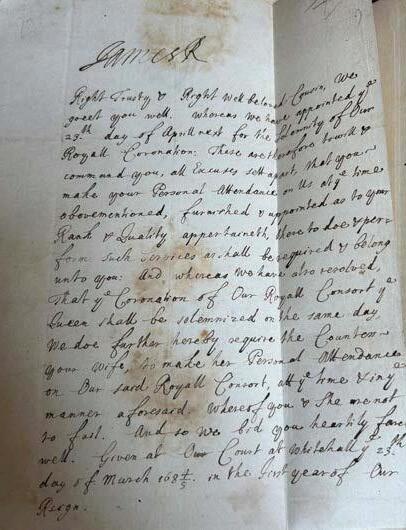
In Trinity term the library and archive teams presented a show-and-tell exploration of the history and quirks of Trinity’s special collections. Favourite items included Trinity ephemera, 15thcentury book vandalism, ‘extra illustrations’, and 17th-century guides on natural magic. The presentations were followed by an exhibition in the Old Library.
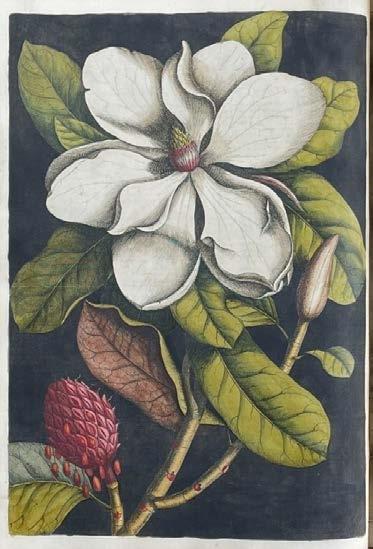
One of the most topical items was a recently discovered letter written by James II (pictured left), found by Sophie Floate, Rare Books Cataloguer, in a biography of James II published in 1808—the letter had been pasted inside. Dated 23 March 1685, the letter is addressed to the Earl of Danby, and commands him to attend James’s coronation.
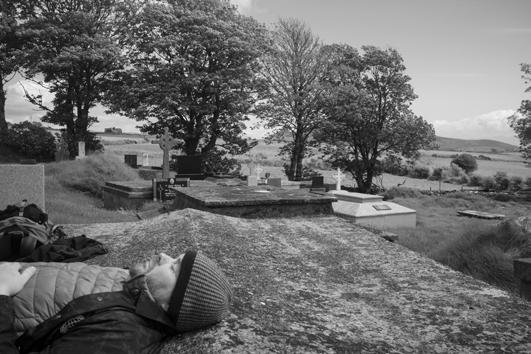
An exhibition including a photography projection project by Kirk Ellingham, Lodge Porter, will take place in the Garden Room in November as part of the Photo Oxford 2025 festival.
The project, titled ‘Last Trip (Say Goodbye)’, records the last holiday Kirk had with his younger brother Brett, while Brett was suffering from a terminal brain tumour. The projection will be shown alongside a small display with a printed newspaper of the project, to raise money for the Brain Tumour Charity. Brett was the first in Kirk’s family to go to university, studying Economics and Business studies at Royal Holloway and eventually working for the NHS at King’s College Hospital and helping train doctors and nurses in better working practices. He spoke four languages and loved to run; he completed the Krakow Marathon.
The exhibition will take place in the Garden Room from 1 to 4 November, between 10am and 6pm. Other events in the festival include a retrospective work by Kirk’s mentor Paddy Summerfield , in the Weston Library, while Geoffrey Batchen, Fellow and Professor of the History of Art, will be speaking at St John’s College on 13 November. More details can be found at https://photooxford.org.

Another popular and successful Events at Trinity season ended with a mix of attractions, including the garden talks (reported below), a discussion on the NHS, and the final classical recital of the season.
The recital was an energetic and lively performance given by La Nuova Musica, one of the UK’s foremost baroque ensembles, directed by David Bates, with soprano Samantha Clarke singing pieces by Handel and Telemann (pictured above).
The discussion on the NHS saw Sir Jonathan Van-Tam, former Deputy Chief Medical Officer, and Professor Kamila Hawthorne, chair of the Royal College of General Practitioners, join Fellow of Trinity Professor Christopher Butler for a frank and wide-ranging discussion on the problems facing the NHS, and how they might be addressed.
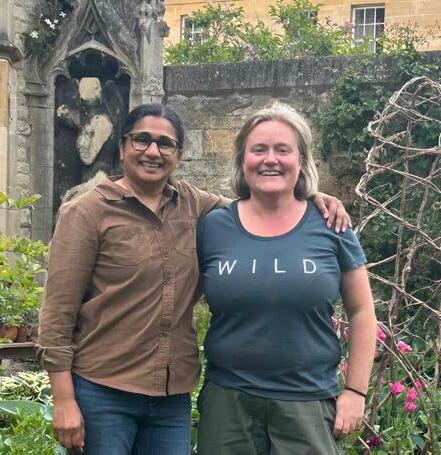
Join the Events at Trinity mailing list to receive advance information and reminders about Trinity’s public programmes; over 250 people from across the UK and even internationally have signed up, and anyone with an interest in these events is encouraged to register to receive all the latest news on the recitals, talks and other events. Sign up at trinity.ox.ac.uk/events-at-trinity
One of the events in the Gardens Season series was a muchanticipated talk in May by Rekha Mistry, gardener, writer and BBC Gardeners’ World presenter. The audience was a rustle of note-taking as Rekha gave her hints and tips on growing.
Rekha has had a fascinating journey into horticulture, appearing as a hobbyist on the BBC’s Big Allotment Challenge and then moving through blogging into professional gardening and writing. Along her journey, she has worked at London’s Inner Temple Garden, where Trinity Head Gardener Kate Burtonwood also started her horticulture career as a volunteer. Kate and Rekha enjoyed reuniting and sharing experiences.
This year’s other talks and tours of the gardens also proved highly popular, Arne Maynard gave a fascinating and beautifully illustrated talk about planted structure and inspiration from natural landscapes, and Chris Beardshaw returned to celebrate the planting of the new long border, explaining the secrets behind the design and its influences.
The next series of events is now planned. In 2026, American plantsman Roy Diblik, home-growing guru Stephanie Hafferty and designer and presenter Nick Bailey will be giving talks, alongside the popular garden tours.
Trinity term events got off to a busy start, as following the May graduation, the marquee was put to good use for a well-attended Family & Friends Afternoon. This was an opportunity for current students to invite guests to enjoy the gardens and see parts of Trinity not usually on view.
A dinner to celebrate the end of Summer Eights for the Boat Club followed, and then term ended with a busy week in June.
The Ralph Bathurst Society Dinner, for major donors, was preceded by a stunning concert from current music student Charlotte Kwok (piano) and recent leaver Lucy Keeley (2021, oboe).
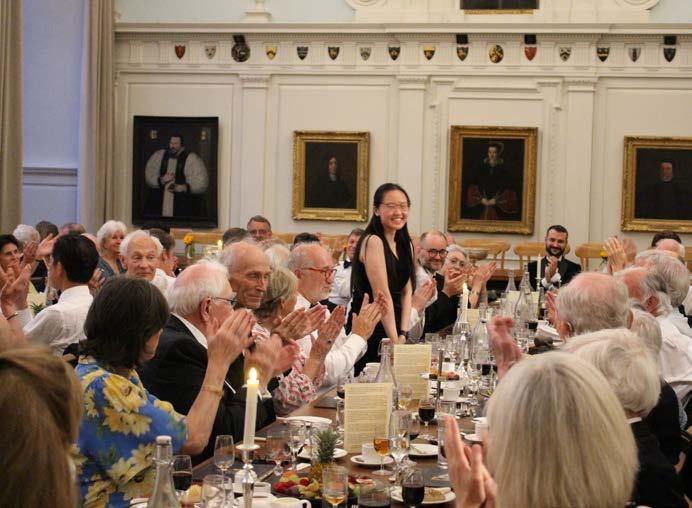
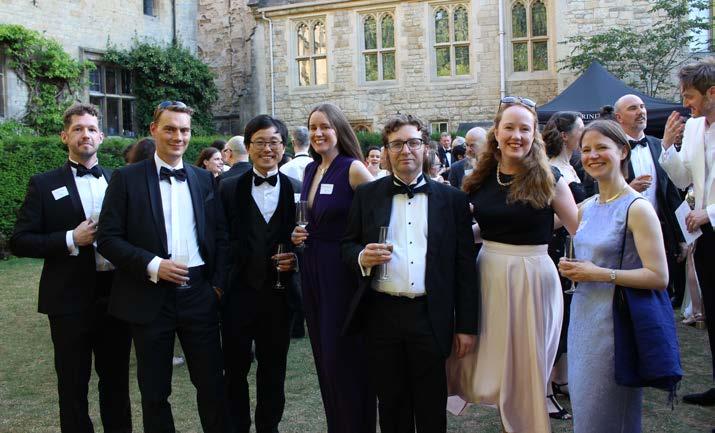
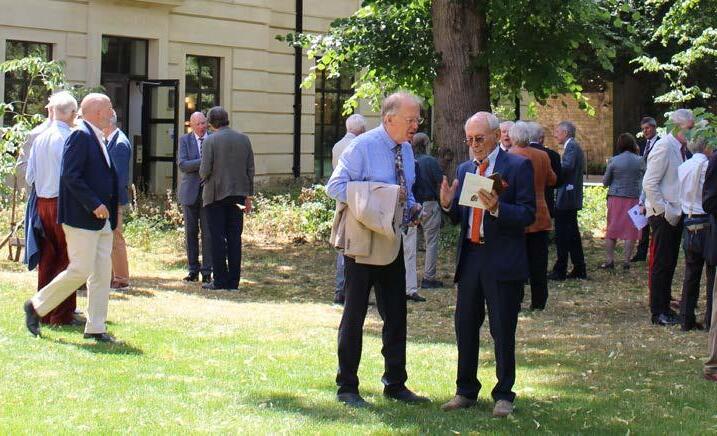
Details of events in the coming months and the downloadable 2025-26 Programme of Events can be found on the inside back cover and at trinity.ox.ac.uk/events.
The following day we had a Garden Party to allow everyone to bid farewell to Dame Hilary, as she prepared to step down as President. It was lovely to offer the opportunity for Old Members and Friends to visit College and say goodbye to Hilary. Peter Strawbridge (1976), who spoke on behalf of the Trinity Society, thanked Hilary, ‘for being our tireless champion, trusted advisor and dear friend to us all.’
Next up was the Fifty Plus Years On Lunch, with Old Members from years up to 1975 filling Hall. The summer events ended with a busy, and very hot, Gaudy for those who matriculated between 2001 and 2003. It was a great pleasure to see many Old Members reconnecting and reminiscing over a delicious meal.
Nevile Martin Gwynne (1960), known as Martin to friends and relations, now in his 84th year, is still teaching in the organisation, GwynneTeaching, which he founded about 12 years ago and which he runs with his daughter. Martin writes, ‘At present GwynneTeaching, which specialises in the Classics, has eight teachers, all of whom have adopted—as a condition of their joining the organisation—the strictly traditional teaching methods which used to be universal, but are now nowhere else to be found in the Englishspeaking world. Its pupils currently range in age from four to 85 years old.’
The late Peter Robertson (1964) finished writing a history of Africa shortly before his death in 2020. Peter’s lifelong interest in history began at Trinity, where he studied Arabic and Persian, a choice inspired by his early childhood in the Middle East. He became an oil company executive and spent much of his career in West Africa.
His widow, Carolyn, has prepared the book for publication, in two volumes, and A Short History of Africa and the Rest of the World by Peter C H Robertson was launched in Cambridge this summer.
This book traces Africa’s history from prehistoric times to the era of independence, exploring the continent’s unique trajectory in relation to the wider world. It challenges conventional narratives, highlighting sub-
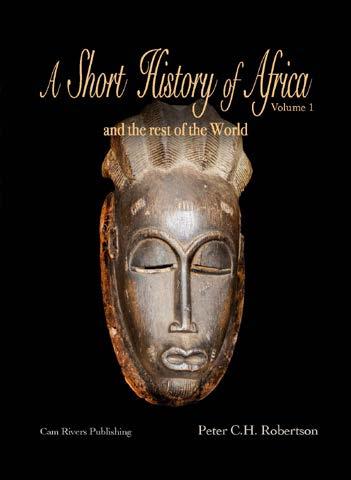
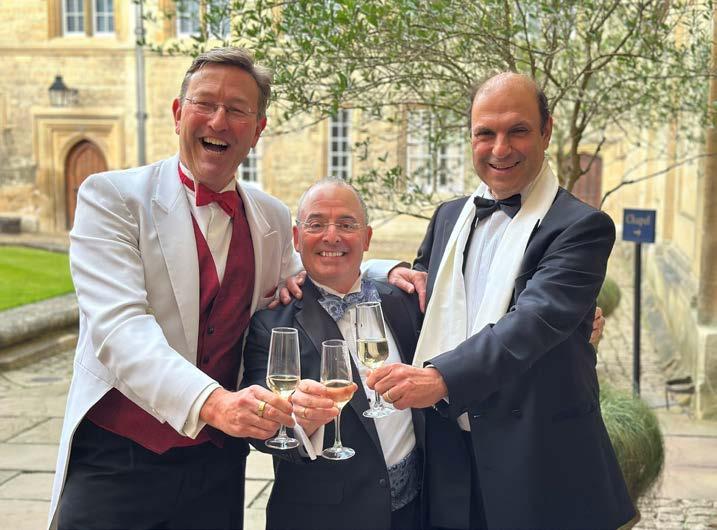
Saharan Africa’s historical isolation and the impact of that on cultural development. Drawing on first-hand African accounts and various Arab and European travellers’ reports spanning 10 centuries, a synthesis of scholarship and narrative invites readers to reassess Eurocentric assumptions and engage with Africa’s vibrant history. More details can be found at cambridgerivers. com; the book is currently only available on Amazon.
Martin Prozesky (1966) has published Mind-Food for Thoughtful Souls (Naledi, 2025). Details can be found at naledi.co.za.
Joseph Mintz (1987) is now Professor of Inclusive Education at University College London.
Huw van Steenis (1988) has been named in the Wall St Journal’s Financial News list of ‘Most Influential in European Finance’ for the second year running.
Síofra Pierse (1994) was appointed Professor of French and Francophone Studies at UCD (Dublin), as of July 2025. She
has been head of UCD School of Languages, Cultures and Linguistics since 2021. She was awarded the title of ‘Chevalier dans l’Ordre des Palmes académiques’ by the French government in 2023 for services to French language and culture. Her latest book is Voltaire: a Guide to his Life and Works (Rowman & Littlefield/ Bloomsbury 2024) and she is currently floating around Paris on sabbatical.
Deborah Schultz Leustean (1995) has recently co-edited a book that resulted from her studies at Trinity. She writes, ‘While working on my DPhil in the Department of the History of Art, I never entered the Photo Archive, considering it outside the scope of my research. However, some years later, having taught art history theory and being interested in archives, I had the opportunity to explore it as Academic Visitor in the department which led to a conference at Christ Church, co-convened with Professor Geraldine Johnson (Christ Church) and at which Professor Martin Kemp (Honorary Fellow of Trinity) chaired a session. The book, Photo Archives and the Place of Photography (Routledge, 2025), co-edited
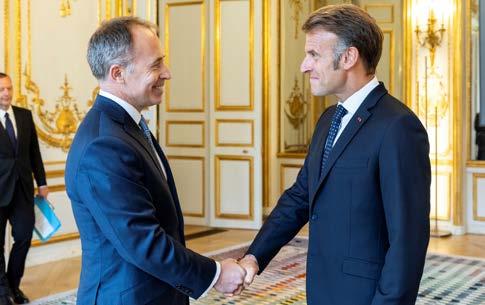
Tom Drew (1989), pictured left, whose appointment as British ambassador to France was reported in the last Newsletter, officially began his term in September, when he presented his letters of credence to the President of the Republic, Emmanuel Macron.
with Professor Johnson, includes chapters by Geoffrey Batchen, Fellow and Professor of the History of Art, Dr Shireen Walton (Anthropology), Geraldine Johnson, me, and eight other international scholars. It investigates the place of photography both literally and metaphorically, addressing the mobility of photographic images as well as how photographs are valued. It takes into account the duality of the photograph as both a two-dimensional image and a tactile three-dimensional object with material qualities.’
On 1 June 2025, the rain held off at Marston Road for the annual tennis match between Trinity alumni and current students.
Former Blues player Louise Fitzpatrick (2020), having played for the students’ team only two years ago, crossed to the other side of the net to bolster the alumni ranks. Accompanying Louise in the alumni team first pair was Oli Plant (2006), regular stalwart and student co-captain from 2008, while Adrian Cunliffe (2002) and Matthew Johnston (1999) renewed their partnership in the second pair. The student team consisted of a potent partnership of Oscar Marsden and Imran Howell in the first pair, ably supported by Adham Saeid and Daniel Tribe in the second pair, where Adham’s strength at the baseline was complemented by Daniel’s lethal predatory play at the net.
A fine afternoon of tennis ensued, filled with keenly fought rallies played in a convivial atmosphere. On this occasion the extra grass court nous told as experience triumphed over youth, culminating in a comfortable 8-0 win for the alumni, although the scoreline did not reflect the many close points and games that went down to the wire. There was time for a quick cooling down and debrief at the Up In Arms pub before heading back to College for a sumptuous dinner at High Table.
Special thanks go to Paul Madden for preparing the grass courts so superbly as always (despite the best attempts of the geese to pollute the turf), and to the Trinity Society for supporting the students’ dinners. If you would like to join the alumni team for next year, please contact Matthew Johnston through the Alumni & Development Office.
Matthew Johnston (1999)
In September, nine Trinity alumni gathered for an afternoon of tennis on the sumptuous lawns of the Queen’s Club (pictured). It could have been a difficult day as the weather was decidedly
Cassiope Sydoriak (2011) was delighted that one of the guests at her recent wedding (announcement on page 26) was Eleanor Smith, with whom she co-founded the Broken Spoke Bike Co-op in Oxford in 2012. The bicycling organisation, which was set up with the aim of improving access to cycling for all in and around Oxford, continues to flourish and serves the Oxford community today from St Thomas School, Osney Lane: bsbcoop.org.
Richard Bunworth (2012) recently completed his PhD in law at University College Dublin. The

temperamental and there was a tube strike, but we all made it and were soon swinging our rackets out on the courts. Beneath scudding clouds and in swirling winds we served up some swashbuckling tennis.
Alicia Middleton (2018) and Louise Fitzpatrick gave no quarter, smacking the ball with real ferocity whilst their respective partners Steven Hurwitz (1970) and Oliver Smyth (1965) opted for the touch that befits their more advanced years. On the adjacent court, Hassaan Mohamed (2011) and Henry Biddle (2002) harnessed both power and control to devastating effect whilst Adrian Cunliffe and Matthew Johnston renewed their partnership of dynamic net play (the former) combined with baseline bludgeoning (the latter), and Fred Satow (1976) acted as referee, encouraging all with his enigmatic smile.
The score was close, but no one was entirely sure what it was, so we retired for some well-earned refreshment and a chance to reminisce about times at Trinity past.
Many thanks to Steven and Fred for arranging such an enjoyable event and to Matthew whose unbridled enthusiasm ensured that we had a wonderful time.
Oliver Smyth (1965)
Nick Valenzia (2021, pictured right) has successfully raised £600,000 in funding for his startup, Leafr. He writes about the origin of the company and the part Trinity has played.
My startup, Leafr, is tackling a growing problem: the climate or ‘green’ skills gap. Small and mid-sized businesses are struggling to keep up with fast-changing sustainability rules without the skills or budget of larger firms. Leafr connects these businesses with their network of independent sustainability consultants on demand and at a fraction of the cost of a traditional consultancy. Since launching the platform after completing my MBA in 2022, the business has grown rapidly and is now the world’s largest network of independent sustainability experts.
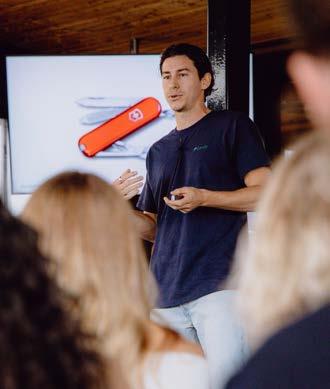
I founded Leafr after years of working in sustainability consulting. We always struggled to find skilled people for projects, and when I graduated from Oxford, I wanted to work across different organisations, but I couldn’t find a platform that let me do that. At the same time, every company I spoke to was desperate for help navigating sustainability. That market mismatch became the spark for Leafr. I could see friction on both sides, so I set out to test the idea: would
thesis was titled ‘EU Merger Control and the Development of an Alternative to the Consumer Welfare Standard: Incorporating the Union’s Social Values’. He was also recently appointed as an assistant professor in Law at Trinity College, Dublin.
The part played by Michael Beloff, President 1996-2006, that led to the Oxford Union voting to admit women in February 1963, has been commemorated with a plaque that was unveiled in June, and hangs above the entrance to the Union’s library. The Union voted to admit women to full membership following a motion proposed by Michael, the then previous Union president. The date for the unveiling of the plaque was chosen to coincide with a significant moment in the Union’s history: for the first time, all four senior officers are women. The current Union president, Anita Okunde (Magdalen 2022), unveiled the plaque with Michael. Michael has continued his support for gender equality, recently by providing legal advice that led, last year, to the Garrick Club admitting women members for the first time.
a flexible, freelance consulting model work in sustainability the same way it had in design or software? Now coming up to three years old, Leafr already counts brands like Freddie’s Flowers, WD-40 and the UN Foundation among its clients, and has received investment from Haatch VC and NextStep, among others.
The rise in our demand is being driven by new rules, particularly in the EU and UK, that require companies to measure and report on emissions, reduce carbon in supply chains, and prove their environmental claims. While huge corporations can invest in adapting to these rules, even larger companies are struggling to keep up without the right sustainability expertise. They face uncertainty, cost, and risk falling behind.
I credit Trinity with playing an early role in the business. I actually worked on the very early ideas for Leafr in the MCR, by the window overlooking Broad Street. I’ve been back a few times since to speak to students, and I’m always impressed by their intelligence and empathy. It inspires me to keep building what we’re building: to get minds like those where they can make the most impact.
More information about Leafr is on its website, leafr.com
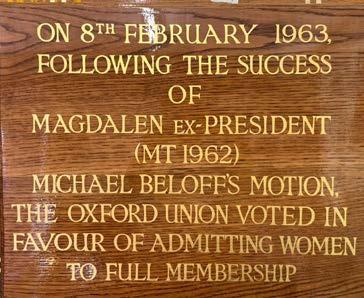
In other news, among the winners of the Vice-Chancellor’s Awards 2025 (see page 9) was the Oxford Young Sport Leaders Programme (OYSLP), run by the Oxford SDG (Sustainable Development Goals) Impact Lab, winning in the ‘Excellence Across Oxford’ category. OYSLP connects local schools with the University through various programmes, including mentoring by University students and workshops led by academics. One of its previous education sessions was ‘Rules of the Game’, with Michael Beloff.
To Simone Few (Dogherty, 2006) and Julian Few (2005), in February 2021, a son, Alfred Kit, and in February 2024, a son, Rufus Knight, brothers to Esther Mae
To Charlotte Watter (2011) and Conor O’Brien, on 6 October 2024, a son, Cormac Tatanka Claymore O’Brien
To Martin Bittner (2014) and Nikita Bittner, on 14 April 2024, a daughter, Amalia Sabine Bittner.
To Bethany White (2014) and Rowan Curtis (2018), on 9 July 2024, a daughter, Cleo Simone Curtis-White.
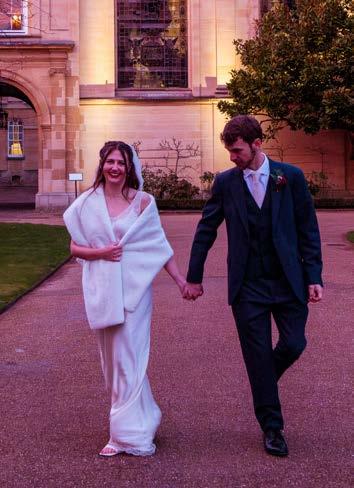


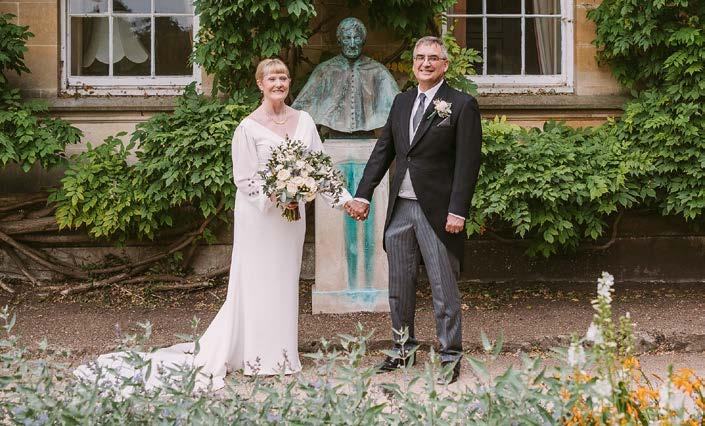
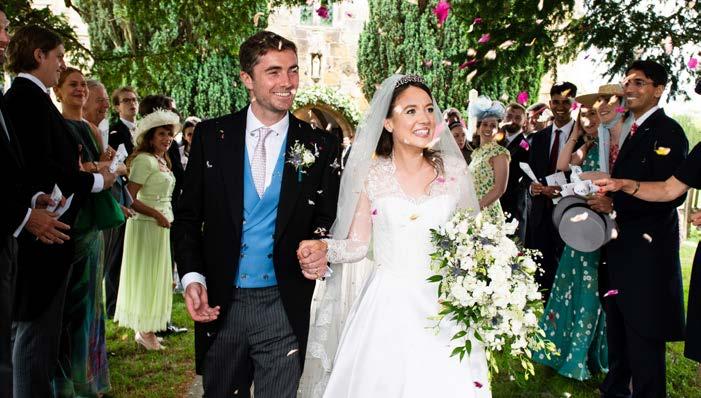
Giles Chapman (1978) to Fiona Bagley, on 16 August 2025, in Trinity College chapel, with the reception afterwards in the President’s Garden and Hall. The service was officiated by the Chaplain, the Revd Joshua Brocklesby. (Top right)
Edward Case (2008) to Lucinda Smart (2011), on 26 July 2025, at St Mary’s Church, Ticehurst. The best man was Max Root (2008) and the ushers included Jamie Enoch, Andy Whitby and Alex Donora (all 2008). Lucy Rands (2011) was a bridesmaid, Conor Kennedy (2011) was MC and a surprise speech (in Latin) was given by Fred Ellis, Aleks Al-Dhahir and Nico Hobhouse (all 2011), with many other Trinity members present. (Above)
Cassiope Sydoriak (2011) to Jefferson Day, on June 13, 2025, aboard the tall ship Clipper City in New York Harbor, reflecting
their shared affection for the historic Seaport District, where they live. (Left)
Bethany White (2014) to Rowan Curtis (2018), on 15 December 2024, at Trinity College. Trinity members present were Julia de Romémont, Henrique Laitenberger (both 2014), Laura Cox (2017), Neil Lewis (2018), Sophie Clarke, and Conor Keogh (both 2019). Rowan’s grandfather, Bruce Hartnell, conducted the ceremony. Bethany and Rowan were delighted that Jon Flint, SCR and Hall Steward, and Ian Stacey, Bar & Café Manager, were on duty; both were a regular part of Bethany’s and Rowan’s lives in college, who first met in the Beer Cellar when Ian was behind the bar. (Top left)
Konstantine Panegyres (2019) to Uom Chantra, on 30 June 2025, at the bride’s house, Enteak Chit Village, Battambang, Cambodia. (Bottom left)
The college has learned, with sadness, of the following deaths:
Robin Ogilvie Graham (1948), on 20 June 2024
The Very Revd Hugh Geoffrey Dickinson (1949), on 30 July 2025
Dr David Treharne Dillon Hughes (1949), on 18 June 2025
The Revd Gerald Fitzgerald (1950), on 16 October 2024 (Charles William) Martyn Grose (1952), on 10 August 2025
John Stowell Allan (1955), on 3 September 2025
Nicholas Raymond ‘Nick’ Bomford (1957), on 21 June 2025
Michael Gavin Lynam Thomas (1957), on 21 August 2025 (William) John Uzielli (1957), on 27 June 2025
Sir Anthony Brian ‘Tony’ Cleaver (1958, Honorary Fellow ), on 13 July 2025
Andrew James Redpath (1958), on 16 April 2025
Robert William Vincent Holland (1961), on 10 August 2025
John Richard Abbott (1965), on 8 June 2025
Anthony John Newsome (1967), on 17 March 2025
The Rt Revd Dr Anthony John Russell (1967, Honorary Fellow), on 9 July 2025
Professor Hugh John Rhys Roberts (1969), in May 2025
David Courtney Boyle (1977), on 20 June 2025
Christopher Martin Cannon (1981), in 2024
Dr Wolfgang Dankmar Rencken (1988), on 20 September 2025
Robert Hunt-Grubbe, Sir Thomas Pope Fellow, on 15 August 2025
Offers to contribute obituaries (up to 300 words) for the Report, or assist with information, would be very welcome: please email report@trinity. ox.ac.uk
Trinity College, Oxford, OX1 3BH
Alumni & Development Office
+44 (0)1865 279 933
development@trinity.ox.ac.uk
Director of Development
sue.broers@trinity.ox.ac.uk
+44 (0)1865 279 889
Development Officer
miriam.hallatt@trinity.ox.ac.uk
+44 (0)1865 279 941
alumni@trinity.ox.ac.uk
Alumni Relations Officer
thomas.knollys@trinity.ox.ac.uk
+44 (0)1865 279 887
Alumni & Events Officer
sarah.jenkinson@trinity.ox.ac.uk
+44 (0)1865 279 942
The full Programme of Events (PDF) and more information and booking details for each event, as they become available, can be found on the website at trinity.ox.ac.uk/events. Please email Sarah Jenkinson (contact details below) with any event enquiries.
William Pitt Society Lunch
Saturday 18 October
A lunch for members of the society created to recognise those who have included Trinity in their wills.
Benefactors Lunch 1
Saturday 8 November
The first of two lunches for Old Members and Friends who have been major supporters of the college’s fundraising during the last financial year (August 2024 –July 2025). Invitations were sent in the summer to those who are eligible.
Carol Service
Saturday 6 December
The choir will lead the singing of Christmas carols interspersed with choir anthems and Christmas readings, followed by seasonal refreshments. Book online now.
Benefactors Lunch 2
Saturday 7 February
Medical Society Dinner
Saturday 14 March
A dinner for all who studied Medicine at Trinity or now work in a medical field.
Gaudy 1992 – 1995
Saturday 21 March
Gaudy 2014 – 2016
Saturday 5 September
Porters Lodge
+44 (0)1865 279 900
Academic Office
academic.administrator
@trinity.ox.ac.uk
+44 (0)1865 279 910
Conferences, Dinners & Functions
conference@trinity.ox.ac.uk
+44 (0)1865 279 888
Website www.trinity.ox.ac.uk f TrinityOxfordAlumni b @trinityoxford i trinitycollegeox
This Newsletter is produced by the Alumni & Development Office. Feedback and suggestions for articles for future editions are very welcome.
